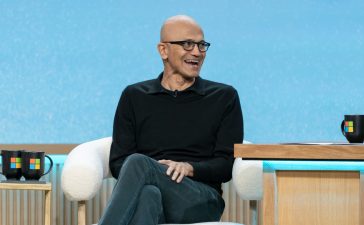CLAYTON — The signs displayed on the front of Enterprise Holdings’ headquarters in Clayton were removed this week and replaced with a new name — Enterprise Mobility — marking a change that leaders describe as both a product of the business’ 65-year history and a signal of what lies ahead.
The transition has been on the horizon for some time. In an interview at the headquarters this week, CEO Chrissy Taylor said that it has been under discussion for about two years. Close observers might have noticed that she was already describing Enterprise as a “mobility” company, not a rental car business, when she was appointed chief executive in 2019.
“The world today knows us as the largest rental car provider,” Taylor said. “But we have evolved, over 65 years, in terms of geography, in terms of customer segments, in terms of the products and offerings that we have.”
People are also reading…
The new name, she said, is a better fit for the company as it exists today.
Taylor said the transition to Enterprise Mobility doesn’t denote any organizational changes. But it’s meant to convey that the company is no longer a pure rental and leasing business anymore, and has expanded into a broad landscape of other offerings, from vanpooling to car sales and truck rentals. And it is poised to evolve even further.
The company has a vanpooling business, Commute with Enterprise, that organizes carpools for companies and employees and supplies vehicles for them to drive to work. The company has experimented with a vehicle subscription model. In 2021, Enterprise purchased a company in Ireland that offers long-term rentals that look more like leasing and allows customers to put different equipment on the vehicle, like refrigeration.
The company has a venture capital team, which has invested in early-stage businesses like a mobile energy storage company and an ultrafast electric vehicle charging company.
Enterprise also has a team focused on advancements in electric vehicles, connected vehicle technology and autonomous cars. All of Enterprise’s St Louis-based officers and department heads drive EVs, and the company has a rotation of makes and models so that employees can learn the different features and charging ranges.
Enterprise Mobility President and CEO Chrissy Taylor is seen on Monday, Oct. 23, 2023, at the company headquarters in Clayton.
“We embrace the responsibility, and the huge opportunity we have, to transition to an electrified fleet. And just electrification in general,” Taylor said. But for now, EVs still make up a relatively small portion of Enterprise’s fleet — several thousand in North America, Taylor said, and several thousand in Europe.
In order to adopt EVs more broadly, Taylor said, Enterprise must be ready to provide a good customer experience with them. Staff need to be ready to advise customers who are flying into unfamiliar cities, where they aren’t acquainted with charging locations. They must be prepared to teach customers how to use the technology, which can be daunting for first-time EV drivers.
“Our people need to take time, and be sensitive to that, and they need the right tools to do that,” Taylor said. “We need to train and develop our people to teach the customer how to use them. That’s really important. It’s got to be a great experience, so we can help in that transition.”
The company is keeping a watchful eye on the looming industry changes, and is ready to move when the time is right, Taylor said. Autonomous vehicles, she said, are likely a more long-term proposition for the company.
“With any technology, we want to make sure we understand: What do we want to get out of this? What’s the outcome? How are we going to use it? And today, it’s not clear how we would use those in our fleet,” she said.
Enterprise’s fleet totals more than 2.3 million vehicles. But the company dates back to a group of just seven that Jack Taylor began lending in 1957, in partnership with the Lindburg Cadillac dealership in Clayton.
At the time, the company was called Executive Leasing Co. and lent to motorists whose vehicles were being repaired. In 1969, he renamed the business Enterprise Leasing, for the Navy ship Enterprise, one of two carriers he served on during World War II. In 1989, the company was renamed Enterprise Rent-A-Car.
Over the years, the company grew into a sprawling business, leasing, lending and selling cars and trucks to businesses and consumers. In 2007, it grew further with the acquisition of Vanguard Car Rental Group, the parent of Alamo Rent A Car and National Car Rental. Two years later, the company was renamed Enterprise Holdings.
Employees arrive to work to new signage showing Enterprise Mobility’s new name on Wednesday, Oct. 25, 2023, at the company’s headquarters in Clayton.
Chrissy Taylor became CEO on Jan. 1, 2020, the company’s third generation of Taylor leadership. Jack Taylor’s son, Andy Taylor, succeeded him as CEO in 1991. Pam Nicholson, the first chief executive from outside the Taylor family, became CEO in 2013. Nicholson retired at the end of 2019.
The company now has upwards of 90,000 employees in more than 90 countries and territories. The daily rental operations are still crucial and remain Enterprise’s largest business. That unit also serves as a pathway for employees into the company’s Management Training Program, which feeds talent into Enterprise’s other lines of business. About 95% of the company’s upper management went through that program, including Taylor herself.
“That is huge for us,” Taylor said. “We know that if we give them the tools and resources, they’re going to stay with us for the long haul.”
The daily rental business has about 1.2 million vehicles, followed by fleet management, with about 675,000 owned vehicles and some managed vehicles. Truck rental has about 90,000 vehicles.
Taylor sees potential to grow Enterprise by expanding its current businesses or through acquisition.
“There is just so much opportunity in front of us,” Taylor said.
Employees mingle beneath a new sign showing Enterprise Mobility’s new name on Wednesday, Oct. 25, 2023, at the company’s headquarters in Clayton.
Photographs from St. Louis Post-Dispatch staff for the week beginning Oct. 15, 2023. Video by Beth O’Malley





